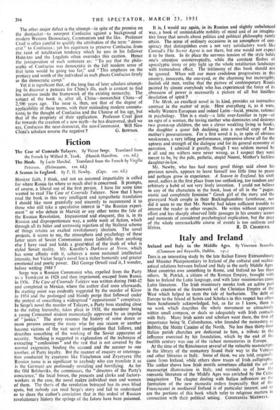Fiction
The Case of Comrade Tulaycv. By Victor Serge. Translated from Peterson. (Heinemann. los. 6d.) A Season in England. By P. H. Newby. (Cape. los. 6d.)
Hoxisr faith, I think, and not an assumed impartiality is called for where Russia (as where so much else) is concerned. It prompts,
of course, a liberal use of the first person. I have for some time wanted to read The Case of Comrade Tulayev. Now that I have read the book in this very intelligent and sympathetic translation
I should like most gratefully and sincerely to recommend it to
those who still take a speculative interest in " the Russian experi- ment " or who debate in Marxist or any other terms the fate of the Russian Revolution. Impassioned and eloquent, this is, in its Russian and disproportionate way, a noble work of fiction, which through all its bitter and sorrowing rejection of the Stalinist scheme of things retains an exalted revolutionary idealism. The novel projects, it seems to me, the atmosphere and psychology of these latter years of Soviet Communism more faithfully than anything else I have read and holds a greatadeal of the truth of what is styled Soviet reality. Mr. Koestler's Darkness at Noon, which has some affinity with it, achieves a more sustained intellectual intensity, but Victor Serge's novel has a richer humanity and greater emotional and poetic power. Did George Orwell read it, I wonder, before writing 1984 ?
Serge was a Russian Communist who, expelled from the Party as a Trotskyist in 1928 and then imprisoned, escaped from Russia in 1936. The Case of Comrade Tulayev was written during 1940-42 and completed in Mexico, where the author died soon afterwards. Its starting point was evidently suggested by the murder of Kirov in 1934 and the prolonged and bloody purge that followed under the pretext of unearthing a widespread " oppositionist " conspiracy. In Serge's novel the murder of Tulayev, a Party boss standing close to the ruling hierarchy, takes place in 1938, the murderer being a young Comsomol student momentarily oppressed by an impulse of " justice." The story resumes the history of some dozen or more persons among the many who for one reason or another become victims of the vast secret investigation that follows, and describes something of the working of the Soviet apparatus of security. Nothing is suggested in explanation of the technique of extracting " confessions" and the rest that is not covered by the normal exigencies, binding the accused and the accuser to one another, of Party loyalty. But the manner of enquiry or interroga- tion conducted by creatures like Fleischman and Zvyeryeva (the Russian name is as significant to anybody who can translate it as
is the German) are profoundly revealing and horrifying. As for the Old Bolsheviks, the commissars, the "directors of the Party's conscience," the local bosses, the peasants and clerks and factory- workers in the case, the novel makes individual men and women of them. The thes;s of the revolution betrayed has its own blind spots, but nobody can read Serge's story and fail to understand or to share the author's conviction that in this ordeal of Russian revolutionary history the springs of the future have been poisoned.
It is, I would say again, in its Russian and slightly unbalanced way, a book of unmistakable nobility of mind and of an imagina- tive force that novels about politics and political philosophy rarely attain. The.sense of ordinary occasions in an amosphcre of con- spiracy that distinguishes even a not very satisfactory work like Conrad's The Secret Agent is not there, but one would not expect it to be there. In its place the nervous tension of the style holds one's attention uninterruptedly, while the constant flashes of apocalyptic irony or pity light up the whole totalitarian landscape with tremendous effect. The testimony of this book should not be ignored. When will our more credulous progressives in this country, innocents, the one-eyed, or the charming but incorrigibly foolish old men, realise that the picture of contemporary Russia painted by almost everybody who has experienced the force of its obsession of power is necessarily a picture of all but limitless –desolation of spirit -?
The Mesh. an excellent novel in its kind, provides an instructive -contrast in the matter of style. Here everything is, as it were, wholly Western European and indeed Latin--lucid, precise, rational in psychology. This is a study—a little' over-familiar in type—of an ogre of a woman, the loving mother who dominates and destroys two grown-up children, the son a clever weakling living in books, the daughter a queer fish declining into a morbid copy of her mother's possessiveness. For a first novel it is, in spite of obvious weaknesses, a very telling performance, impressive above all for the aptness and strength of the dialogue and for its general economy of narration. I admired it greatly, though I was seldom moved by it all and my withers were never wrung, as I suspect they were meant to be, by the pale, pathetic, stupid Noemi, Mother's luckless daughter-in-law.
Mr. Newby, who has had many good things said about his previous novels, appears to leave himself too little time to pause and perhaps grow in experience. A Season in England. his sixth novel, suffers in the first place from too unthinking, too random and arbitrary a habit of not very lively invention. I could not believe in any of the characters in the book, least of all in the " pagan.
exotic and completely feminine " Greek girl of the story and the graveyard Nash couple in their Buckinghamshire farmhouse, nor did it seem to me that Mr. Newby had taken sufficient trouble to interest the reader in other respects. He writes without apparent effort and has sharply observed little passages in his country scenes and moments of considered psychological explication, but the pace of the whole unremarkable course of events is too uniform and


































 Previous page
Previous page